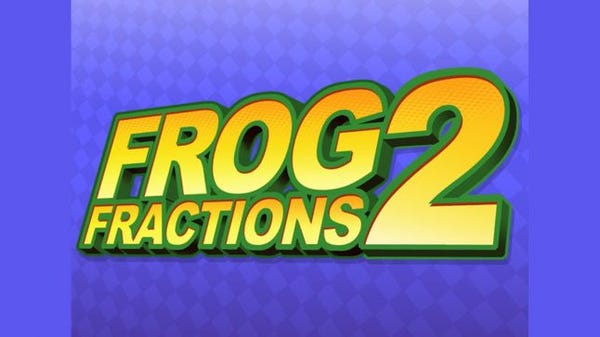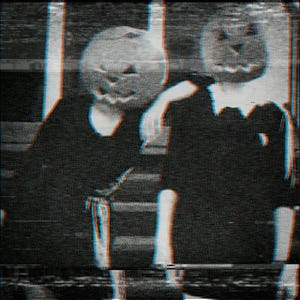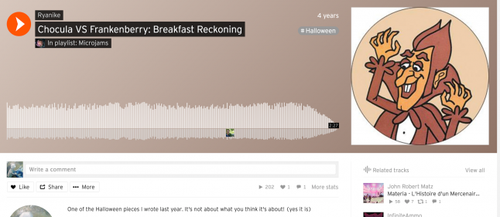Trending
Opinion: How will Project 2025 impact game developers?
The Heritage Foundation's manifesto for the possible next administration could do great harm to many, including large portions of the game development community.

Featured Blog | This community-written post highlights the best of what the game industry has to offer. Read more like it on the Game Developer Blogs or learn how to Submit Your Own Blog Post
While working on the Frog Fractions 2 score, I was asked to write everything from TV and game spoofs to Renaissance-era choral music. I'll walk you through how I prepared for this bonkers soundtrack, and what I learned helping to create it.


Writing music for game developer Jim Crawford is kind of like working for a flame-haired, mask-wearing Astral Plane Trickster God that materializes on your Slack channel from time to time to proclaim his whimsical decrees.
Jim: *POOF* "Nyeh nyeh nyeh nyeh! I daresay that a bit of Revolutionary War themed dubstep is in order for my next devlish minigame!"
Me: "Revolutionary dub- . . . what? Like, with a fife? And wobble bass?"
Jim: "Hohohohooo, indeed! Also, we'll be needing a jaunty little track that reminds one of the opening theme to All In The Family, while not tarrying so close as to bring CBS and her litigious legions down upon our heads!"
Me: "All In The Family? From the 70's? But I've never even seen-"
Jim: *Cartwheeling* "Fiddledeedee, that reminds me, the Medical Malpractice Simulator segment still needs music! Whip us up something that sounds like Sade's "Smooth Operator" except all the percussion is made by heartbeat monitors and MRI machines, there's a fine lad."
Me: "Only like four people are gonna get that joke. I don't even-"
Jim: "Wonderous, I knew you were up to it! I'm off to program a racing sim you can only control with a 'Hey You, Pikachu!' microphone! A-tah-taaaah!" *POOF*
Me: " . . . "
As with all things, I'm exaggerating just a tad. Jim and I had been friends for a bit before I signed on to Frog Fractions 2, so I knew what to expect. He's also great to work for, allowing me tons of creative freedom and room to come up with my own musical ideas. Also, he's essentially nine feet all, so if he actually did come at you in any kind of ceremonial mask, your first inclination would be to run like hell, putting as many innocent bystanders and overturned produce carts between you and him as you possibly could.

Pictured: Jim Crawford, maybe.
Frog Fractions 2, more than any other game I've worked on, taught me the value of being versatile as a creative. People who make stuff–whether it's music, visual art, stories, whatever–tend to develop a wheelhouse and stick with it. Maybe you specialize in pixel art, or dark, character-focused noir narratives. That's a good thing! Honing in on a particular style and getting awesome at it is what helps to set you apart from other people in your field.
Yet, as great as being a specialist is, there's something to be said for being flexible as a creative. While I had a blast working on Frog Fractions 2, it was still one of the more challenging games I've ever done because it demanded that I use my skills in a lot of different ways. I had to know about ancient music history, TV-theme tropes from the 90s, SNES JRPG music (ok, that one was a freebie), and industrial synth grunge, whatever that is. Working on this score reminded me that specializing in a personal style is a great way to make your voice stand out, but being adaptable to creative work that's outside your norm is just as important.

This is the first image that comes up when you
do a Google search for "industrial synth grunge"
Luckily, if you want to become a more versatile, whether it's to land a more diverse array of gigs or to prepare for a crazy grab bag project, becoming a better "all around" artist is totally doable. Here are a few things I learned while working on Frog Fractions 2 that should help:
For the love of god, start now
I am so lucky that I married my wife. This isn't some attempt at winning brownie points through the long-revered romance language of game industry blog posts, either. It's just a fact. When I first seriously started pursuing game music as a career in 2010, I was disorganized, never planned ahead, and thought "business sense" was just what happened when Daredevil uses his echolocation to help you find where you left your tax returns.
My wife is amazing at all of those things, and knew if left to my own devices I'd end up playing back-up keytar in a Devo cover band. So she sat me down, gently pushed a dark chocolate mocha toward me across the table, and said "Starting now you're going to write a new piece of music every week. You're going to try a bunch of new styles and it's going to be hard and kind of scary and you're going to do it anyway. You're also going to post them all online."
"But what if they're bad?" I asked.
"Especially if they're bad" she said.
I started what I would soon call my "Microjams" series later that week. Every Wednesday, regardless of whatever else I had on my plate, I wrote a new, short track in a different style. One week, I tried chiptunes for the first time. Another, I wrote a Western themed tune even though I definitely didn't have any of the instruments I needed. After that, I gave horror music a shot. Some weeks I only had time to write a tiny, 5-second cue, and others I got carried away and wrote full 4-minute tracks.

Also, one week this happened.
You can listen to them here, if you want. A couple of them are pretty good, several are horrible, and they're all universally mixed as if I was using the built-in speakers on a calculator watch for studio monitors.
Yet, despite many of these making me cringe when I go back and listen to them now, writing them, and doing it early on in my career, was one of the best things to ever happen to my music. Forcing myself to make tons of music that wasn't "my specialty" meant that when Tom Francis asked me to write a jazz soundtrack for Gunpoint, I felt ready despite not being a jazz musician. When a film director needed a cheesy 80s horror score for a zombie movie, I was ready because I'd already done 80s synthwave and horror music on my own, so it was just a matter of figuring out how to combine them. And when Jim asked me to do a whole bunch of stuff I'd never even tried before for Frog Fractions 2, I was excited rather than terrified, because I knew from years of doing Microjams every week that I'd be able to handle it.
If you take one piece of advice from this article, make it this one. Starting this month–hell, this week if you can–set aside a regular time to challenge yourself. Make it a routine. Set limits on it so it stays manageable (for example, each Microjam had to be finished by the time I had to leave to teach piano on Wednesday). Try making art you've never tried before, art that scares you. Make art in styles and genres you normally hate, and see what you can do to change that, to make it your own. And most importantly, share what you make online. Even if it's bad, or incomplete, or not what you wanted it to be. I know it sounds scary, but knowing people can see the new avenues you're exploring will push you to keep doing it, to keep getting better. Plus, if you make it clear you're learning, you'll get a lot of encouragement and validation, and who doesn't love that?
Oh, Let's Break It DOWN
If any of the three remaining people who read this far play Overwatch, you see what I did there. If you see me in game say hi! I'll be the guy spamming Tracer's "laugh" emote until an enemy Roadhog literally devours me whole and poops my mangled body into the hole on Illios.

Hello there, old friend.
Anyway, let's talk about what to do when a client asks you to make them something and you have no idea where to start. They want a Peruvian tambourine concerto or a comic book about an orthodontist who solves teeth and gum based crimes, and you're freaking out. Now what? First:
1. Get examples. See if your client can send along some Youtube videos, mp3s, or any other media that might give you a concept of some or all of the ideas they're trying to get across. Then:
2. Study. Spend some time going over this stuff to get a feel for what they're after. This is where many creatives stop, but I recommend an additoinal step:
3. Break it down. Write down 5-10 points describing what you're seeing. Any traits you notice about the material are fine.
I'll give you an example: one of the first songs Jim asked me to write for Frog Fractions 2 was a Hanna-Barbera style cartoon track, like you'd hear on The Yogi Bear Show or The Flintstones. I'd seen a lot of that stuff when I was a kid and had a vague idea of what he wanted, but wasn't really sure where to start. I got a few examples of tracks from the cartoons that were in line with what he wanted, but in addition to just listening to them a few times, I wrote down anything I noticed about them. The tempo (slow, relaxed), the instruments used (a lot of goofy brass and glockenspiel), the emotions the songs were trying to convey (lightheartedness, charm). Soon, I didn't just have an idea of how to proceed, I had a specific set of guidelines on how to make exactly what my client was asking for! Also, I'd literally written "The robot from The Jetsons makes me smile" in a notebook, so the police will definitely assume I'm the serial killer whether or not I had anything to do with it.

"Sir, I'm gonna have to ask you to come down to the station."
Parodies Suck
One of the hardest things for an artist to do is parody other art. You have to get close enough to the original so that people understand the reference you're making, but not so spot-on that you're plagarizing. You also need to find a way to make your version interesting and engaging without filling the exact same role as the thing you're quoting. It seems nearly impossible to do all of that and then also have it be something that doesn't make you want to take the dried wizard's finger that gave you your artistic ability in the first place and grind it 'neath your heel while bellowing a spiteful cry of rage at the uncaring gods above.
I was asked to do several parodies for Frog Fractions 2, and while I don't want to go into specifics in order to avoid too many spoilers, I would like to talk about one parody that went well, one I think I could've done better, and why.
1. "Seinfeld Parody": In one game segment, I decided a track that reminded people of the Seinfeld theme would be funny. I followed the "break it down" step above, listening to the theme to refresh my memory and writing down as many traits that defined the way it sounded as possible. In the end I wrote something that I think sounds pretty close, right down to the slap bass and the cartoony mouth percussion.
2. "Carmen Sandiego Parody": In another part of the game, I needed to make something that recalled the kids' game show, which is literally my dream assignment. I started out with over-the-top doo-wop vocals and an upbeat attitude, but while it sounded like the show's theme, it didn't feel right. In the end, because of the gameplay in that part of Frog Fractions 2 (which I won't spoil), I ended up keeping the doo-wop, but setting it as a super-sad Gregorian chant, medieval style.
Spot the difference? One of these managed to get close to the source material without overtly stealing, but it didn't offer anything new. In the other, I wrote something that would cause listeners to associate the track with the original song, but which also put a different spin on it. It wasn't just supposed to be funny because it kind of sounded like a thing; it was supposed to be funny because it reminds you of that thing while also subverting your expectations in some way.
Working on this game reminded me that the real trick to doing parodies is adding a new layer to the thing you're trying to emulate. Making art that is very comparable to other art has it's place, sure, but that's not really offering anything new. It's not approaching the source material from an inventive angle. It's not really a parody at all, it's just . . . similar. Adding some of your own originality can turn a simple copycat into something memorable.

If nothing else, slap a shit ton of reverb on it. Everyone loves that.
Making a few parodies of works you like is a great way to practice your versatility as a creator, even if you never get asked to do an actual parody yourself. We've all been in this position:
Your client is going over your first drafts, and they're really digging a lot of what you've put out so far! But suddenly, you feel a dark chasm open in the pit of your stomach. You hear laughter in the distance, and even though you can't figure out where it's coming from, you know it is the laugh that will end the world. Your client's head spins around 360 degrees, their eyes turn onyx black, and in a thousand tongues at once, all of which you can understand even though none of them are human, they say–
"This is really great! But could you make it more like X?"
–where "X" is Firewatch or Hotline Miami or Beyblade: Super Tournament Battle or something. I know a ton of creators who haaaate it when this happens; it can feel like, rather than your raw originality and talent, you client is just asking you to just copy the work of someone else. But unless you're working with someone who literally wants exactly that, this is actually a good thing!
Find out what things your client specifically likes about "X," write those traits down (cough, see above), and then see what you can do to create something that uses those items but which is infused with your own unique voice and perspective. If they want music like Skyrim, maybe give them something broad and epic like Jeremy Soule's soundtrack, but based only around the instruments you play. If they want sprites like Owlboy, perhaps try something cute and with a lot of personality, but with characters who look hand-painted instead of pixelated. If they ask you to write a story that has a tight, cohesive narrative structure like Zack Snyder's Sucker Punch, WHY ARE YOU WORKING WITH THIS PERSON CALL THE POLICE.

"Sir, I'm gonna have to ask you to come down to the station."
Being An "All Around" Creative Doesn't Mean Losing Your Voice
It just means more gigs, and the ability to take on more challenging ones at that. As you continue to expand your skillset into new and unfamiliar territory, remember that getting good at a lot of things doesn't mean you have to stop doing "your" thing. Are you a super rad chiptunes lady? Awesome! Now you can be the super rad chiptunes lady who can also knock out orchestral scores or blues-rock when she has to. Are you guy who's known for super sleek, minimal UI? Great! Now you've still got clients coming to you for that, but you can also whip up an interface for an MMO that needs to convey a ton of information.
And remember, if you end up with your own Astral Plane Trickster God dev who needs you to move in a lot of creative directions at once, you can totally handle it. You literally have to, actually, because the only other option is to utter the incantation that will dispel him back to his Prankster's Throne, and even then you need the Japester's Gem for it to work and there's a minotaur and it's like a whole fucking thing.
You know what? Forget I mentioned it.
Read more about:
Featured BlogsYou May Also Like